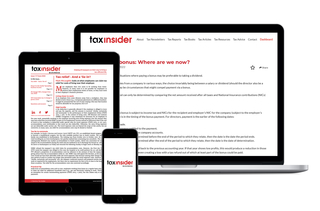 Chris Thorpe looks at some of the issues to be aware of when paying dividends to spouses.
Chris Thorpe looks at some of the issues to be aware of when paying dividends to spouses.
----------------------
This is a sample article from our business tax saving newsletter - Try Business Tax Insider today.
---------------------
When a married couple runs a business together through a limited company, proper tax planning would dictate that both spouses own shares to receive dividends.
Salaries may or may not be paid as well, depending on other income sources, but dividends will inevitably be the main means of profit withdrawal from the company.
Dividends
Alongside the company’s profits and distributable reserves, levels of dividends will ideally be planned around the individual’s other income – in relation to any salary received from the company or by another employer or source.
Salary and pension
The possibility of a salary along with pension contributions is something to consider. The likelihood is that both individuals will be directors of the company (or one as director and maybe the other as company secretary); this will enable the payment of a nominal officers’ fee and pension contributions.
This sum is often pegged at the level of secondary National Insurance contributions (NICs) thresholds to ensure that the company (as employer) pays no NICs, but the individual still receives social security benefits. A pension contribution matching that fee can be received income tax-free for the officer, and is deductible for the company.
If a greater salary is desired, the director would also need to be an employee of the company, carrying out work which warrants an appropriate salary. If the salary is too large, HMRC would likely deem it as not being ‘wholly and exclusively’ in respect of the company’s business and restrict or deny the corresponding corporation tax deduction.
The employer pension contributions should ideally be no more than the salary – anything in excess of this runs the risk of HMRC’s considering it not being ‘wholly & exclusively’ or as taxable salary. It must be remembered, too, that an individual’s annual pension allowance of £60,000 includes employer contributions.
Beware: Settlements!
The biggest potential trap is the ‘settlements legislation’. These rules (contained in ITTOIA 2005, Pt 5, Ch 5) go back to the Finance Act 1936, and essentially prevent the diversion of income to others paying a lower rate of tax. Those ‘others’ are the settlor’s spouse or minor unmarried children. If any ‘settlement’ (defined as any ‘disposition, trust, covenant, agreement, arrangement or transfer’, per section 620(1)) is created without commercial foundation, the person by whom it was created is the ‘settlor’; if they or their spouse retain a benefit in the settled asset, or their minor unmarried children receive a payment, the settlor will be taxed on the income instead.
Examples of settlements falling foul of this include the settlor taking a smaller salary than usual to create artificially high distributable reserves, which are then paid to the spouse or a trust for the benefit of the children; dividend waivers, which cause reserves to increase, which are then paid to the spouse through dividends; and alphabet shares which allow greater levels of dividends to be paid to the spouse (or the children’s trust).
Exception for the spouse
The settlements legislation only applies to transfers to the settlor’s spouse if the latter receives ‘wholly or substantially a right to income’, i.e., purely diverted income; it will not apply if the transfer also consists of some underlying capital with that income or something which gives it some justification. This inter-spousal exemption is enshrined in ITTOIA 2005, s 626.
Practical tip
When paying dividends to a spouse, besides the legality of the dividend and the spouse’s marginal tax rate (along with any salaries paid from the company), care must be taken to ensure the dividend is paid in accordance with the shareholding or some other underlying justification.



